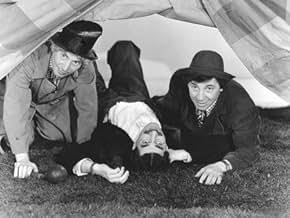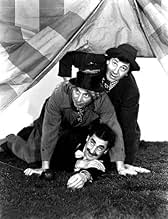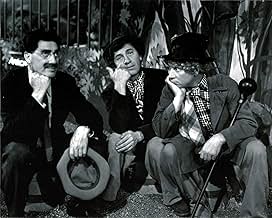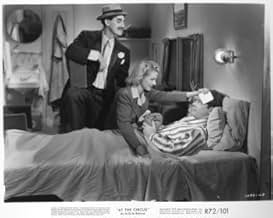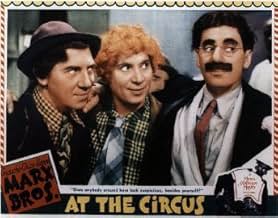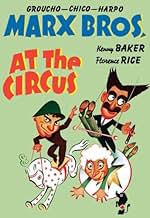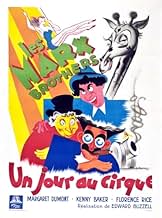NOTE IMDb
6,8/10
6,6 k
MA NOTE
Ajouter une intrigue dans votre langueThe Marx Brothers try to help the owner of a circus recover some stolen funds before he finds himself out of a job.The Marx Brothers try to help the owner of a circus recover some stolen funds before he finds himself out of a job.The Marx Brothers try to help the owner of a circus recover some stolen funds before he finds himself out of a job.
- Réalisation
- Scénario
- Casting principal
- Récompenses
- 2 victoires au total
Jerry Maren
- Little Professor Atom
- (as Jerry Marenghi)
Mariska Aldrich
- Mannish Woman
- (non crédité)
Irving Bacon
- Telegraph Clerk
- (non crédité)
Willie Best
- Redcap
- (non crédité)
John Binns
- Old Man
- (non crédité)
William A. Boardway
- Party Guest
- (non crédité)
George Bookasta
- Member of Quartette
- (non crédité)
Avis à la une
The sad fact about the Marx Brothers is that after the movie A NIGHT AT THE OPERA, their career was all downhill. While A DAY AT THE RACES and ROOM SERVICE were still very good, their subsequent efforts were painfully ordinary and generally unfunny. It was like they were playing lethargic caricatures of themselves. And, from what I gathered, the Marxes WERE very content to just collect a paycheck at this point in their lives.
Some of the blame for the static nature of this film also must be given to MGM--a studio that had a history of ruining good comedians when they came under DIRECT MGM control (Laurel and Hardy's films were distributed by MGM but were created by the independent-minded Hal Roach Studios). If you don't believe me, look at all the Marxes films from the late 30s on as well as Buster Keaton's films of the 30s--they rely on an MGM formula and lack all the frenetic intensity of the comedians' earlier non-MGM efforts.
The film is a by-the-book effort where the Marx Brothers own a circus. Despite this, the film is low on energy and laughs--and should under no circumstances be confused with Chaplin's film The Circus.
Some of the blame for the static nature of this film also must be given to MGM--a studio that had a history of ruining good comedians when they came under DIRECT MGM control (Laurel and Hardy's films were distributed by MGM but were created by the independent-minded Hal Roach Studios). If you don't believe me, look at all the Marxes films from the late 30s on as well as Buster Keaton's films of the 30s--they rely on an MGM formula and lack all the frenetic intensity of the comedians' earlier non-MGM efforts.
The film is a by-the-book effort where the Marx Brothers own a circus. Despite this, the film is low on energy and laughs--and should under no circumstances be confused with Chaplin's film The Circus.
The decline of the Marx Brothers does not begin with ROOM SERVICE, which is hysterical at it's conclusion, but with AT THE CIRCUS. Groucho always insisted that had Irving Thalberg lived his care would have made the other films in the contract after A DAY AT THE RACES as good as that and A NIGHT AT THE OPERA. This meant that the film had to be taken on the road as a Vaudeville show, and the material tested carefully. But Thalberg was dead, and Louis B. Mayer was quite unsympathetic to these three clowns who were...well clowns, and who had gotten too good a sweetheart contract from Thalburg in terms of profits. Mayer thought of comedians as interchangeable, and could not care about allowing talented ones to test their material - you hand them a script and that was that: they are paid to make it funny. If they don't you fire them.
So it is traditional to blame AT THE CIRCUS, GO WEST, and THE BIG STORE on Mayer's hostility. That hostility played a major role (there is just no denying it), but in the case of AT THE CIRCUS there is another point that is frequently overlooked. In movies by comedians, it was rare for a circus comedy to be really funny. W.C.Fields, YOU CAN'T CHEAT AN HONEST MAN was an exception - a truly funny circus comedy, but it's strength was the film record of Field's radio feud with ventriloquist dummy Charlie McCarthy. Had it been set in a movie studio or a bank or a foreign country it would have been just as successful. But other comedians were not as lucky. Charlie Chaplin worked two years on THE CIRCUS, and while a good film it was not the great film he hoped to make. The atmosphere of a circus should have been inviting to comics - after all, here clowns were really clowns. But for some reason the special needs of movie funny-men were hard to translate into the atmosphere of the big top. Possibly the best use of the big top as a comic background was in Laurel & Hardy's short film THE CHIMP. The first quarter of the film shows how they wreck the circus (which was on it's last legs anyway). But the remaining three quarters of the film deal with the boys problems with a rooming house owned by a jealous Billy Gilbert, and the title "chimp" they hope to sell to a zoo.
With the Marxes the circus just does not absorb them too much. Groucho is there, hired as a lawyer to assist Kenny Baker and his pal Chico. Harpo, as Chico's brother, is a circus roustabout. But there is little example of their involvement in the circus life of the troop or of the animals (Harpo should have been involved with circus horses, anyway). Bits of the film are actually quite good - like Chico and Harpo trying to find papers in Nat Pendleton's (the circus strongman's) room. They manage to turn it into a Christmas nightmare for poor Pendleton. And Groucho certainly has two great moments: the business of trying to get on the circus train without knowing the password (even one of the animals knows the password), and his singing "Lydia The Tattooed Lady".
There were some cuts, apparently. Groucho had a sequence where his trial skills were shown in a court presided over by Edgar Kennedy. One wishes they had kept that in the film. The poor portions, mostly tied to the sickeningly sweet and naive Kenny Baker (fighting the crooked James Burke) are overwhelming. At least Groucho was able to have another session with Margaret Dumont as Mrs. Dukesberry (Baker's aunt), and poor Margaret gets shot out of a cannon in the end. But the drab spots outnumber the good ones. Not too bad, but still just mediocre as a result.
So it is traditional to blame AT THE CIRCUS, GO WEST, and THE BIG STORE on Mayer's hostility. That hostility played a major role (there is just no denying it), but in the case of AT THE CIRCUS there is another point that is frequently overlooked. In movies by comedians, it was rare for a circus comedy to be really funny. W.C.Fields, YOU CAN'T CHEAT AN HONEST MAN was an exception - a truly funny circus comedy, but it's strength was the film record of Field's radio feud with ventriloquist dummy Charlie McCarthy. Had it been set in a movie studio or a bank or a foreign country it would have been just as successful. But other comedians were not as lucky. Charlie Chaplin worked two years on THE CIRCUS, and while a good film it was not the great film he hoped to make. The atmosphere of a circus should have been inviting to comics - after all, here clowns were really clowns. But for some reason the special needs of movie funny-men were hard to translate into the atmosphere of the big top. Possibly the best use of the big top as a comic background was in Laurel & Hardy's short film THE CHIMP. The first quarter of the film shows how they wreck the circus (which was on it's last legs anyway). But the remaining three quarters of the film deal with the boys problems with a rooming house owned by a jealous Billy Gilbert, and the title "chimp" they hope to sell to a zoo.
With the Marxes the circus just does not absorb them too much. Groucho is there, hired as a lawyer to assist Kenny Baker and his pal Chico. Harpo, as Chico's brother, is a circus roustabout. But there is little example of their involvement in the circus life of the troop or of the animals (Harpo should have been involved with circus horses, anyway). Bits of the film are actually quite good - like Chico and Harpo trying to find papers in Nat Pendleton's (the circus strongman's) room. They manage to turn it into a Christmas nightmare for poor Pendleton. And Groucho certainly has two great moments: the business of trying to get on the circus train without knowing the password (even one of the animals knows the password), and his singing "Lydia The Tattooed Lady".
There were some cuts, apparently. Groucho had a sequence where his trial skills were shown in a court presided over by Edgar Kennedy. One wishes they had kept that in the film. The poor portions, mostly tied to the sickeningly sweet and naive Kenny Baker (fighting the crooked James Burke) are overwhelming. At least Groucho was able to have another session with Margaret Dumont as Mrs. Dukesberry (Baker's aunt), and poor Margaret gets shot out of a cannon in the end. But the drab spots outnumber the good ones. Not too bad, but still just mediocre as a result.
The Marx Brothers burst onto the scene in the 1929 comedy "The Cocoanuts". Over the next few years they starred in some of the all-time classics, namely "Horse Feathers" and "Duck Soup".
Then something happened. I don't know the reason, but they left Paramount (which financed the aforementioned movies) and moved to MGM. By that point, MGM was well established as the domain of happy-go-lucky musicals, and it showed in the Marx Brothers' movies. Far from the biting satire of their earlier movies, these newer movies tended to show them performing antics in various settings: opera, horse racing, and now the circus. "At the Circus" is funny, but it's no "Duck Soup".
Ignoring all that, there's plenty of laughs to be had here (and quite a few hot babes). Enjoyable in that respect. Jerry Maren (Atom) is best known as one of the Munchkins in "The Wizard of Oz" and died only last year, making him not only the last surviving speaking cast member from TWoO, but the last surviving cast member from a Marx Brothers movie.
Then something happened. I don't know the reason, but they left Paramount (which financed the aforementioned movies) and moved to MGM. By that point, MGM was well established as the domain of happy-go-lucky musicals, and it showed in the Marx Brothers' movies. Far from the biting satire of their earlier movies, these newer movies tended to show them performing antics in various settings: opera, horse racing, and now the circus. "At the Circus" is funny, but it's no "Duck Soup".
Ignoring all that, there's plenty of laughs to be had here (and quite a few hot babes). Enjoyable in that respect. Jerry Maren (Atom) is best known as one of the Munchkins in "The Wizard of Oz" and died only last year, making him not only the last surviving speaking cast member from TWoO, but the last surviving cast member from a Marx Brothers movie.
This was my third time watching AT THE CIRCUS and, the characteristically anaemic leads (who somehow always seem to be able to carry a tune) notwithstanding, I've always been kind of partial to this one (even if the end result is, decidedly, a notch or two below their finest work). Plot and setting provide several opportunities for the Marxes to shine, both as a team and individually: Groucho (as always) is the film's trump card, however, especially in his rendition of 'Lydia, the Tattooed Lady' and the separate scenes he shares with befuddled aristocrat Margaret Dumont and scheming circus performer Eve Arden; other highlights include Groucho and Chico's interrogation of the suspicious-looking dwarf, Chico and Harpo's frenzied search for stolen money in the strong-man's room (while the latter is asleep!), and the typically busy climax in which Dumont receives the ultimate humiliation.
AT THE CIRCUS is the Marxes' third best MGM picture (demonstrating a steady decline for them from picture to picture) but it's still inferior to the later A NIGHT IN CASABLANCA (1946), in my opinion or any of their early Paramount films, for that matter.
AT THE CIRCUS is the Marxes' third best MGM picture (demonstrating a steady decline for them from picture to picture) but it's still inferior to the later A NIGHT IN CASABLANCA (1946), in my opinion or any of their early Paramount films, for that matter.
Mercilessly and outrageous Marx Brothers comedy that partially works well , thanks to some funny sketches , though they've done it better before . It suffers from excessive musical comedy plotting , but it gives the zany threesome some funny and really comic elaboration . Here the Marx Brothers try to help the owner of a circus recover some stolen funds before he finds himself out of a job. Antonio Pirelli (Harpo Marx) and Punchy (Chico Marx) , who work at the circus, together with roguish lawyer Loophole (Groucho Marx) , attempt to find the thief and get the money back. The 3 Mad Mullahs of Mirth in their grandest, goofiest roar rodeo! . A tentful of girl-gorgeous musical fun! . Not suitable for general exhibition ! .They're a circus.... in a circus !. This Way Folks...to a tentful of Girl Glamorous Musical Fun! A 30-ring circus of laugh-splashed thrills! The animals are in cages...but the Mad Marxes are on the loose! The Show of Shows...to keep the world Singing and Laughing!. Keep the world laughing!
Relentlessly comical and busy comedy with musical interludes that still works at times . Definitely sub-standard Marxism as the brothers set about saving a circus from bankruptcy in various hilarous set pieces. Amusing moments , mucho ado with badges , Groucho singing ¨Lydia the Tattoooed Lady¨ and the endless insulting repartee with Margaret Dumont , but the whole thing is rather dull and over-familiar. Beginning of the end for the Marxes , a step down in quality from their classic work , though frequently dam fun . Excellent Harpo Marx , as usual , he even did many of his own stunts , he later said it was a silly thing for a 49-year-old . At the Circus (1939) is annoyed by a lot of dated and bored songs , such as : Step up and take a bow , Lydia and Tattoed lady , two blind loves , blue moon . The motion picture was regular but professionally directed by Edward Buzzell , known for : Transient Lady (1935), Little Johnny Jones (1929) y Ain't Misbehavin' (1955) , among others .
Other important films starred by Marx Brothers -many of them Broadway farce plays transfered by scenarists into vehicle for the Brothers- , they are the following ones : ¨Animal crackers¨, ¨Duck soap¨ that was a flop when first released but today considered a masterpiece , ¨Horse Feathers¨, ¨At the circus¨, ¨A night at the Opera¨,¨Day at the races¨ , ¨Room service¨ , ¨Go West¨, ¨Love Happy¨ and ¨Night in Casablanca¨, though in 1946 the Marx formula was weak and wearing thin . Any film with Groucho , Chico , Harpo and Margaret Dumont is well worth seeing .
Relentlessly comical and busy comedy with musical interludes that still works at times . Definitely sub-standard Marxism as the brothers set about saving a circus from bankruptcy in various hilarous set pieces. Amusing moments , mucho ado with badges , Groucho singing ¨Lydia the Tattoooed Lady¨ and the endless insulting repartee with Margaret Dumont , but the whole thing is rather dull and over-familiar. Beginning of the end for the Marxes , a step down in quality from their classic work , though frequently dam fun . Excellent Harpo Marx , as usual , he even did many of his own stunts , he later said it was a silly thing for a 49-year-old . At the Circus (1939) is annoyed by a lot of dated and bored songs , such as : Step up and take a bow , Lydia and Tattoed lady , two blind loves , blue moon . The motion picture was regular but professionally directed by Edward Buzzell , known for : Transient Lady (1935), Little Johnny Jones (1929) y Ain't Misbehavin' (1955) , among others .
Other important films starred by Marx Brothers -many of them Broadway farce plays transfered by scenarists into vehicle for the Brothers- , they are the following ones : ¨Animal crackers¨, ¨Duck soap¨ that was a flop when first released but today considered a masterpiece , ¨Horse Feathers¨, ¨At the circus¨, ¨A night at the Opera¨,¨Day at the races¨ , ¨Room service¨ , ¨Go West¨, ¨Love Happy¨ and ¨Night in Casablanca¨, though in 1946 the Marx formula was weak and wearing thin . Any film with Groucho , Chico , Harpo and Margaret Dumont is well worth seeing .
Le saviez-vous
- AnecdotesFor Groucho Marx' performance of "'Lydia, the Tattooed Lady", additional lyrics were written by E.Y. Harburg exclusively for screenings of the film for Allied servicemen in European war zones. The special lyrics included the line "When she stands the world grows littler; When she sits, she sits on Hitler.' This version of the song was filmed, and included in prints of the film distributed in Great Britain and France, and was greeted with marked enthusiasm during screenings in those countries.
- GaffesDuring the "Swingali" number, three boys playing saxophones stand up and play "Auld Lang Syne," but the instruments heard on the soundtrack are clarinets.
- Citations
Peerless Pauline: I've waited so long to find someone like you.
J. Cheever Loophole: Oh, someone *like* me, I'm not good enough for you, eh?
- ConnexionsFeatured in From the Ends of the Earth (1939)
- Bandes originalesLydia, the Tattooed Lady
(1939) (uncredited)
Music by Harold Arlen
Lyrics by E.Y. Harburg
Sung by Groucho Marx and chorus, with Chico Marx at piano
Meilleurs choix
Connectez-vous pour évaluer et suivre la liste de favoris afin de recevoir des recommandations personnalisées
- How long is At the Circus?Alimenté par Alexa
Détails
- Durée
- 1h 27min(87 min)
- Couleur
- Rapport de forme
- 1.37 : 1
Contribuer à cette page
Suggérer une modification ou ajouter du contenu manquant


